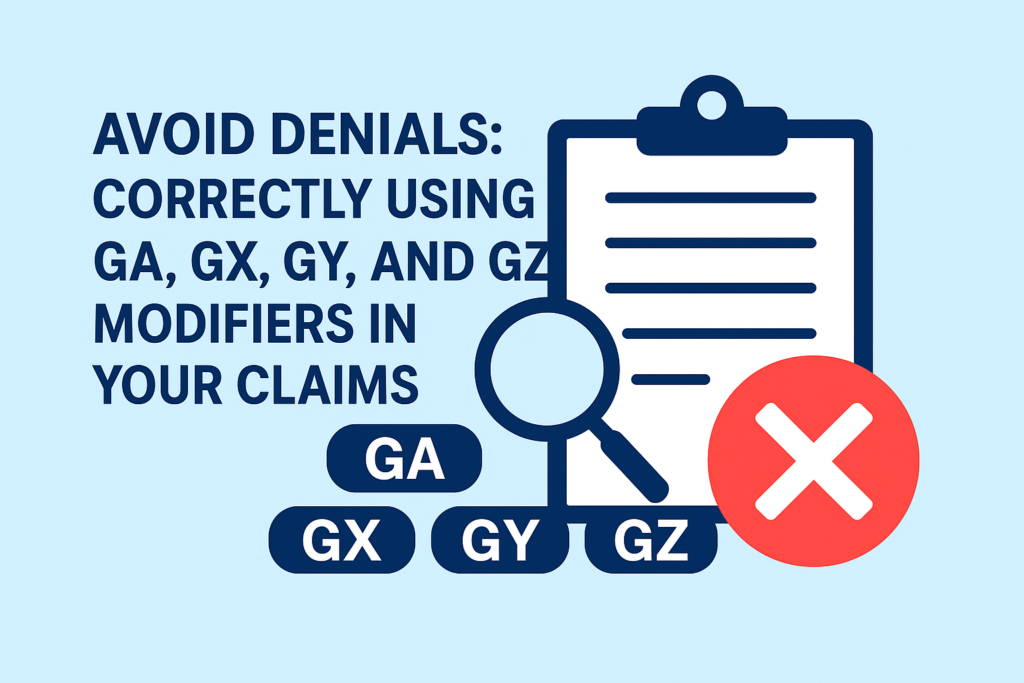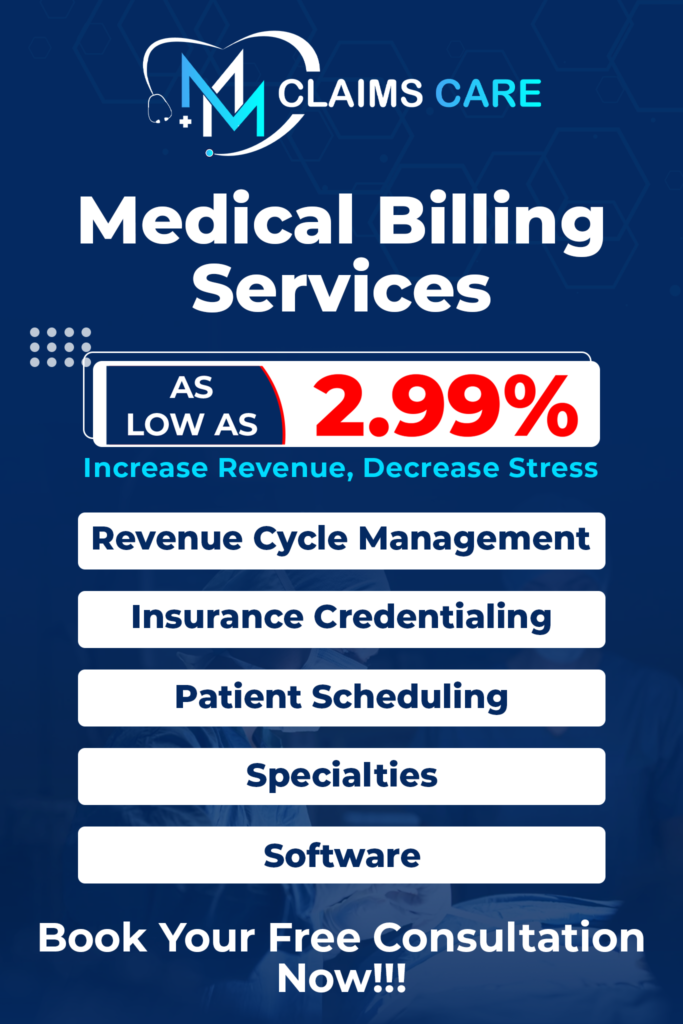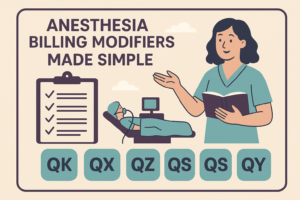In the medical billing field, professionals bill a lot of patient’s data, and medical billing modifiers differentiate these patients. Misused or misunderstood modifiers can result in the denial of the claim which is a more frustrating and time-consuming process. The ABN (Advance Beneficiary Notice) specifies Medicare modifiers to add additional information about the rendered service or procedure. Medicare specifies different types of modifiers and among those four most common modifiers that confuse most of the healthcare providers are GA, GX, GY, and GZ modifiers. Accurate use of these modifiers can result the efficient claim processing and impact the revenue of healthcare practices. If you want to save your practice from denials due to modifiers then let’s discuss in detail the importance of modifiers, when to use them, and how they impact your reimbursement.
What Are These Modifiers?
GA, GX, GY, and GZ are HCPCS Level II modifiers used in Medicare billing. They’re all related to non-covered services. These services Medicare doesn’t pay under certain circumstances. Each modifier tells Medicare something specific about the situation. It is just like a message attached to a claim. The main thing is to use the right modifier at the right time.
Why are Modifiers Important?
Modifiers are important for the providers to give more clear and concise information about the rendered services. Their main purpose is to clarify any confusion about relevant services. They help clarify specific details such as the circumstances of the service, location, or level of complexity which can impact reimbursement rates and payer policies. Then modifiers also impact the payment of healthcare providers. Correct usage ensures proper reimbursement and reduces the risk of claim denials.
What is GA Modifier?

The GA modifier is used to notify Medicare that the beneficiary has received notification about the potential denial of coverage and has consented to accept financial responsibility for claims. With this notification, the patient gets to know in advance that a specific service is expected to be rejected by Medicare. The patient signed an Advance Beneficiary Notice (ABN) and the claim was submitted. The GA modifier is used when:
- You know Medicare probably won’t cover the service
- You’ve informed the patient via an ABN, and
- The patient signed it before the service was performed.
Why it matters: If you don’t use GA and the claim is denied, you might be stuck paying the cost. Even you can’t legally bill the patient without the signed ABN. It is not necessary to attach the ABN with the claim but it must be available when asked for.
Example: You provide a routine foot care service that isn’t medically necessary in this case. You hand the patient an ABN, they sign it, and you bill Medicare with the GA modifier. If the claim’s denied (which you expect) then the patient will be responsible for the cost, not your practice.
How to Properly Apply the GA Modifier
Step 1: Issue an Advance Beneficiary Notice (ABN)
Give the patient an ABN before starting the process. The ABN must list the specific item or service, explain why Medicare may not cover it, and provide an estimate of the costs for which the patient will be liable if Medicare denies the claim.
Step 2: Record the Patient’s Recognition
Make sure the patient signs the ABN as a sign of acknowledgment. Even if the patient refuses to sign then you should still proceed with the GA modification.
Step 3: Include the GA Modifier
Add the GA modifier to the relevant procedure code when filing the claim with Medicare. This indicates that the patient has been notified of their potential financial responsibility and that the ABN is on file.
What is GX Modifier?

Healthcare professionals apply GX modifiers to services that Medicare does not cover. They use this modifier to inform patients that they will be financially responsible for the non-covered treatment and that an Advance Beneficiary Notice (ABN) has been voluntarily provided. Medicare will immediately reject the claim if any covered charges have the GX modifier added to them. The GX modifier is used when:
- The service is definitely not covered by Medicare.
- An ABN is not required but you still give one.
- You’re not expecting Medicare to pay, this is more about documentation and clarity.
Example: Let’s say you provide a routine physical exam. Medicare doesn’t cover it. You give the patient a voluntary ABN just to make sure they’re aware and you add the GX modifier.
Most of the time the GX modifier is used along with other modifiers like the GY modifier and together both serve the purpose and say that we know this isn’t payable by Medicare and we told the patient ahead of time. It can be used with a TS Modifier that is used for follow-up services. But remember that the GX modifier will result in a rejection if submitted with the following modifiers:
- EY: No physician or other licensed health care provider orders for this item or service.
- GL: Medically unnecessary upgrade provided instead of a non-upgraded item, no charge, no ABN.
- KB: Beneficiary requested an upgrade for ABN, more than four modifiers were identified on the claim.
- QL: Patient pronounced dead after ambulance called.
- TQ: Basic life support transport by a volunteer ambulance provider.
What is GY Modifier?

The GY modifier is for items or services that Medicare explicitly excludes. No ABN is needed here but some providers give one anyway (with the GX modifier) just to avoid surprises. Providers indicate that a service is legally excluded and not covered by Medicare by adding the GY modifier to a claim. The GY modifier should be added to services that do not fulfill the criteria for being listed as Medicare benefits.
The use of the GY modifier clarifies that Medicare does not cover the service and the recipient is responsible for the payment. With the help of these modifiers, patients can understand better their financial obligations and prevent uncertainty.
Example: You provide a massage therapy session. Medicare does not cover massage—period. So, you use the GY modifier to indicate that you know this and aren’t trying to sneak it through. And on another scenario, you’re billing a routine dental cleaning. Medicare doesn’t cover dental services like that so you’d attach the GY modifier.
Using GY makes sure Medicare properly denies the claim. Why would you want a denial? Because with the proper documentation, you can bill the patient instead.
What is GZ Modifier?

The GZ modifier is the one you don’t want to use unless you have to. This modifier is used to signal that Medicare doesn’t intend to cover a service or item because it isn’t considered essential or reasonable. It’s a red flag that you provided a service likely not covered by Medicare and did not get a signed ABN. This basically tells Medicare that we didn’t follow the rules but go ahead and deny this anyway. The GZ modifier will be used in scenarios:
- When a provider is aware that a treatment does not fit Medicare’s definition of medical necessity.
- When the patient was not given an Advance Beneficiary Notice before receiving the service.
Medicare handles GZ modifier claims in the same way as regular claims, however the line item will be immediately denied. This automated rejection clarifies the denial reasons and simplifies the claims adjudication procedure.
Example: A patient receives a non-covered lab test and for whatever reason, the front desk forgot to get the ABN signed. The biller still sends the claim with the GZ modifier but Medicare will definitely deny it and you probably can’t bill the patient.
Why it’s a problem: No ABN means no patient liability. Your practice consumes the cost.
Why These Modifiers Matter More Than You Think
Misusing these modifiers doesn’t just mean a denied claim but it can also lead to:
- Compliance issues: Medicare audits can find all the errors. The use of any improper modifier can raise red flags.
- Lost revenue: If you miss collecting from patients then you’ll pay the cost.
- Patient confusion: Nobody likes a surprise bill and nobody likes a practice that can’t explain what went wrong.
No doubt Modifiers are like a small detail but are essential to keep your billing clean and compliant. The best medical billing company ensures the accurate use of these modifiers.







